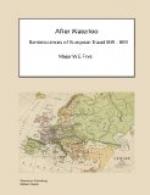To return to my first day’s journey from Turin. It was a very long day’s work, and we did not arrive at Asti till very late, after having performed the last hour, half in the dark, on a road which is by no means in good repute. The character of the lower class of Piedmontese is not good. They are ferocious, vindictive and great marauders. They make excellent soldiers during war and they not unfrequently, on being disbanded after peace, by way of keeping their hand in practise and of having the image of war before their eyes, ease the traveller of his coin and sometimes of his life. Our conversation partook of these reminiscences, and during the latter part of our journey turned entirely on bandits “force and guile,” so that we were quite rejoiced at seeing the smoke and light of the town of Asti and hearing the dogs bark, which reminded me of Ariosto’s lines:
Non molto va che dalle vie supreme
De’ tetti uscir vede il vapor del
fuoco
Sente cani abbajar, muggire armento,
Viene alla villa, e piglia alloggiamenti.[80]
Nor far the warrior had pursued his best,
Ere, eddying from a roof, he saw the smoke,
Heard noise of dog and kine, a farm espied,
And thitherward in quest of lodging hied.
—Trans. W.S. ROSE.
We met on alighting at the door of a large spacious inn, two ladies who had very much the appearance of the two damsels at the inn where Don Quixote alighted and received his order of knighthood; but, in spite of their amorous glances and a decided leer of invitation, I had like Sacripante’s steed more need of “riposo e d’esca che di nuova giostra.” The usual Italian supper was put before us, and very good it was, viz., Imprimis: A minestra (soup), generally made of beef or veal with vermicelli or macaroni in it and its never failing accompaniment in Italy, grated Parmesan cheese. Then a lesso (bouilli) of beef, veal or mutton, or all three; next an umido (fricassee) of cocks’ combs and livers, a favourite Italian dish; then a frittura




